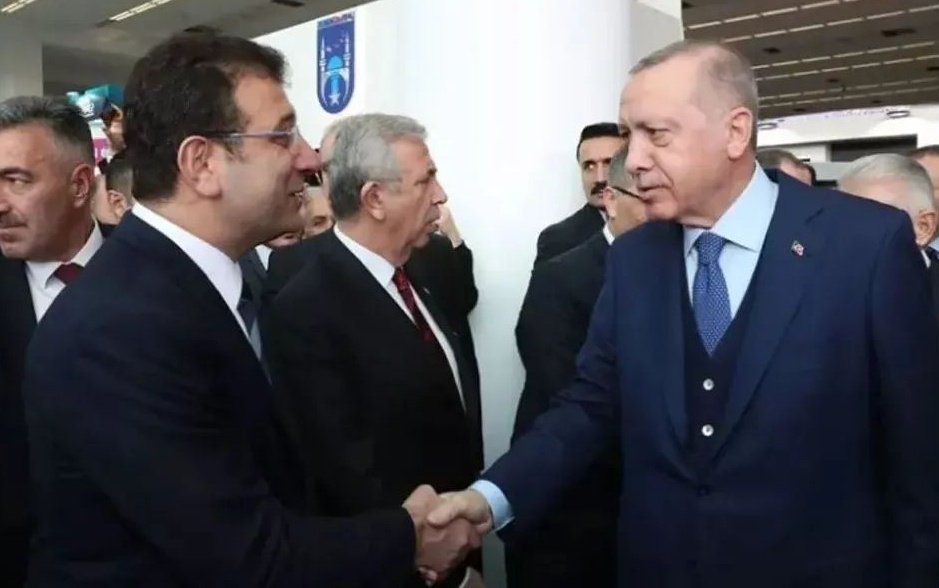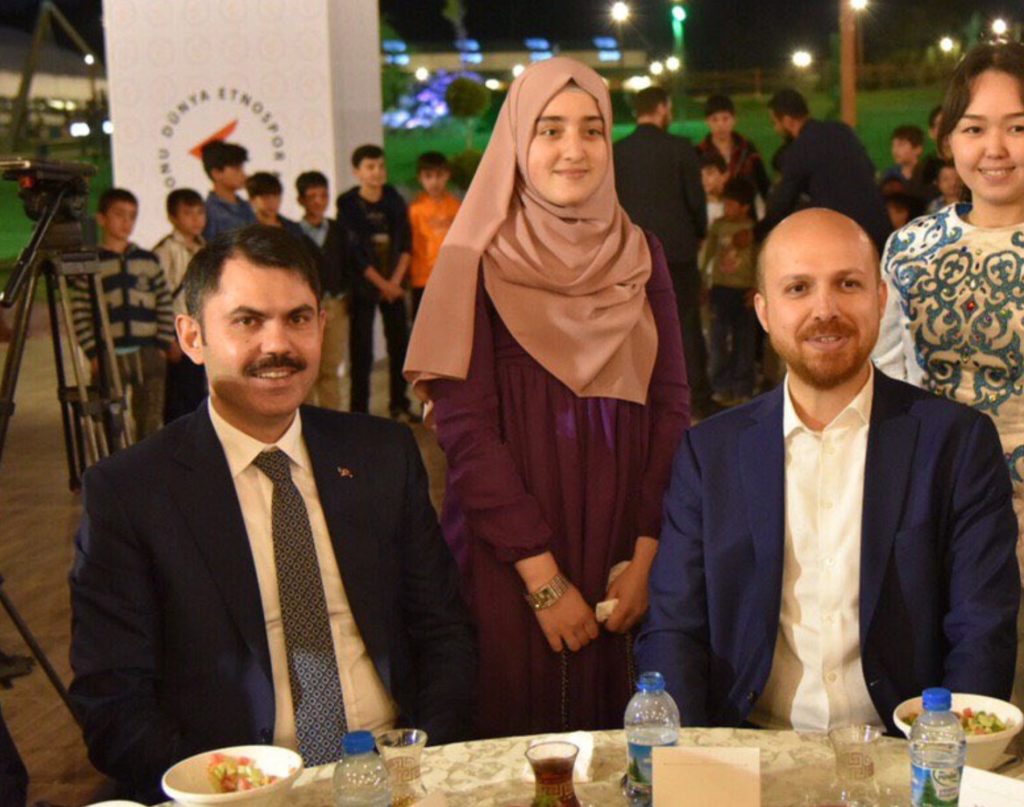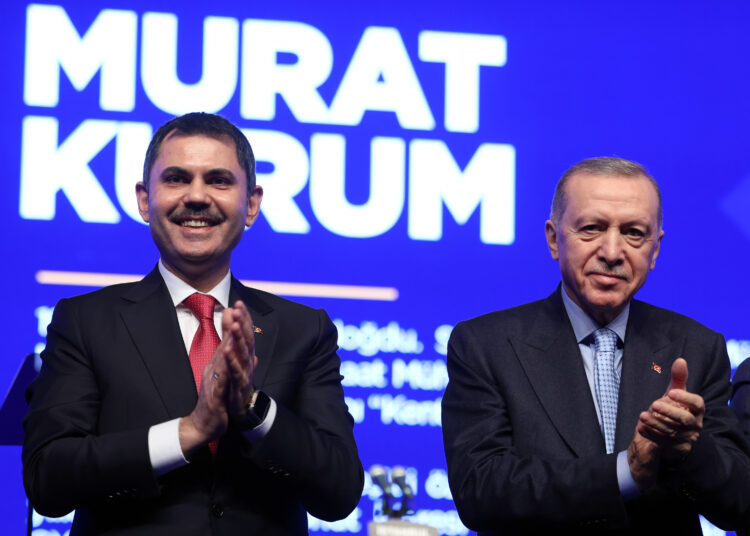Levent Kenez/Stockholm
Turkish President Recep Tayyip Erdogan has nominated Murat Kurum, the former minister of environment and urbanization,, as the mayoral candidate for Istanbul in local elections set for March 31. Kurum, a former bureaucrat, had previously been accused of links to illegal activities related to corruption in zoning and was among the suspects in an investigation involving Erdogan family members.
Erdogan’s choice of a candidate for Istanbul has long been a subject of curiosity. The shift in power to the opposition from the Justice and Development Party (AKP) in Istanbul and Ankara in 2019 had caused shockwaves within the ruling AKP.
Following his re-election as president in May, Erdogan’s primary goal was to reclaim Ankara and Istanbul. Especially with the current mayor of Istanbul, Ekrem İmamoglu, being touted as a potential presidential candidate in 2028, Erdogan aims not only to defeat him in the local elections but also to dim his rising star.
However, Kurum wasn’t perceived as one of the shining stars by the ruling party’s base. It’s evident that Erdogan considered Kurum’s lack of leadership qualities, even if he were to win the election, indicating that Kurum wouldn’t be able to lead the party. According to political observers, Erdogan is planning for his son, Bilal Erdogan, or his son-in-law, Selçuk Bayraktar, to take over the presidency after him.
An alternative strategy could have been to nominate one of these two family members for Istanbul and potentially elevate them to leadership positions by winning the elections Yet, Erdogan seems reluctant to risk an early finale by facing the possibility of losing.
Kurum, holding a degree in civil engineering from Selçuk University in Konya, served as Erdogan’s minister of environment and urbanization from 2018 until May 2023. According to media reports the 47-year-old native of Ankara emerged triumphant in an internal party poll overseen by Erdogan last month. Kurum has a background in Turkey’s housing development administration prior to being named minister and became a member of parliament representing an Istanbul district last year. His wife, Şengül, has been in a senior position at Turkey’s influential media regulatory body, the Radio and Television Supreme Council (RTÜK), since 2021. The opposition alleges that Kurum’s wife, a mathematics teacher, secured a position at RTÜK through nepotism, something that is frequently encountered in Turkey.

One advantage of Kurum’s past experience is the claim that he is an ideal figure for the reconstruction of a city facing the possibility of a devastating earthquake and undergoing urban transformation. Shortly after being nominated as a candidate, Kurum addressed the issue of earthquakes in a speech.
However, Kurum’s past does not solely revolve around urban planning expertise. An early Nordic Monitor investigation uncovered worrying details about Kurum. The investigation revealed his involvement in major graft and kickback schemes in the past and his participation in corrupt business activities benefiting the family of President Erdogan.
Starting from a modest government position in Ankara, Kurum quickly rose to a position of power and influence. He transitioned to heading an important real estate company in 2009 and eventually became a minister in 2018. This rise in stature was significantly facilitated by close connections cultivated with President Erdogan’s family, particularly with the president’s son, Bilal Erdogan, and his son-son-in-law and former minister Berat Albayrak.

The investigations into Kurum’s illicit business schemes, purportedly executed on behalf of the Erdogan family, gained traction in September 2012. It began with a tip-off regarding Ali Agaoglu, a construction mogul accused of acquiring public properties at lower prices and making substantial profits through illegal means involving bribery of government officials for zoning and building code modifications.
Upon exposure to potential irregularities in Agaoglu’s business dealings and the subsequent risk of legal consequences, Kurum sought cover from Abdullah Oguz Bayraktar, the son of then-minister for environment and urban planning, Erdogan Bayraktar. Sadık Soylu, an advisor to Bayraktar, was also involved in concealing these illegal activities.
Following orders from the investigating prosecutor, the police initiated an inquiry into the allegations. The probe revealed a more extensive scheme than initially reported, leading to the authorization of wiretaps on the suspects. Subsequently, after a confidential investigation spanning several months, the public prosecutor identified Kurum as a central figure in kickbacks, graft related to public property sales, urban transformation projects and zoning changes favoring government-affiliated individuals.
The evidence from the wiretaps demonstrated Kurum’s involvement in an organized crime syndicate. According to a 32-page summary obtained by Nordic Monitor, Kurum was part of a gang that exploited their ties to government officials, engaging in illegal business activities that caused the state substantial losses amounting to hundreds of millions of dollars. This syndicate operated in close coordination with officials from the Ministry for Environment and Urban Planning.
Wiretaps revealed how Murat Kurum was involved in an organized crime syndicate:
Kurum initiated his dubious dealings when selected by the Erdogan family in 2006 to lead a special section in Istanbul’s state-owned Housing Development Administration of Turkey (TOKİ). Over time, he gained significant authority through government empowerment, regulatory changes in urban development projects and crucial decision-making roles in Istanbul’s urban transformation initiatives.
By 2009 he had risen to the presidency of a real estate and property development company, Emlak Konut Real Estate Investment Partnership (GYO), partly owned by TOKİ and overseen by Erdogan’s office during his tenure as prime minister.
The case file against Kurum revealed that Abdullah Oguz Bayraktar, the minister’s son, was head of the crime syndicate. The prosecutor charged 22 suspects, including Kurum, with forming a criminal gang and engaging in corruption and malpractice, leading to warrants for their detention. The syndicate manipulated construction planning changes for companies awarded projects by TOKİ and resolved issues faced by firms dealing with provincial preservation boards, all in exchange for bribes.
Kurum, under ministerial directives, pressured construction companies linked to Emlak Konut and TOKİ to redirect contracts to firms associated with him and his cronies. They were also involved in resolving zoning issues for prominent businessmen’s major construction projects in return for bribes.
The investigations also exposed instances where Kurum and his associates bribed bureaucrats to facilitate construction on land hosting historically significant buildings, environmentally protected zones or green spaces. Additionally, they caused financial losses to the state by falsely declaring maintenance costs for protected public properties within construction zones.
The investigation revealed how Kurum unlawfully allocated apartments to individuals close to the government, diverting them from low-income families. This was despite the fact that these apartments were designated as affordable housing as part of government-controlled real estate projects.
Moreover, the corruption and kickback scheme run by Kurum allegedly operated with the knowledge of then-prime minister Erdogan and had his support. Evidence from phone conversations revealed instances where construction mogul Agaoglu promised to donate land to an Erdogan family organization, the Foundation for Youth and Education in Turkey (TÜRGEV).
Despite being detained in a corruption investigation in December 2013, Agaoglu escaped legal consequences as the government hindered and eventually buried the probe.
According to Canadian-based journalist Said Sefa, Kurum played a pivotal role in managing the business affairs of the Erdogan family, particularly Bilal Erdogan, functioning as a financial manager for the family over the years. His rise from 2006, initially placed in a critical position in TOKI’s Istanbul branch, to later heading Emlak Konut in 2009, coincided with amendments and changes in urban development codes and permits that benefitted individuals and entities close to the Erdogan family. Sefa described Kurum as a central figure in exploiting Istanbul for personal gain, culminating in his former role as minister of environment and urban affairs.
If Kurum wins the mayoral election, he won’t just defeat Erdogan’s most feared opponent; he’ll also be the overseer of zoning profits on behalf of the Erdogan family.












